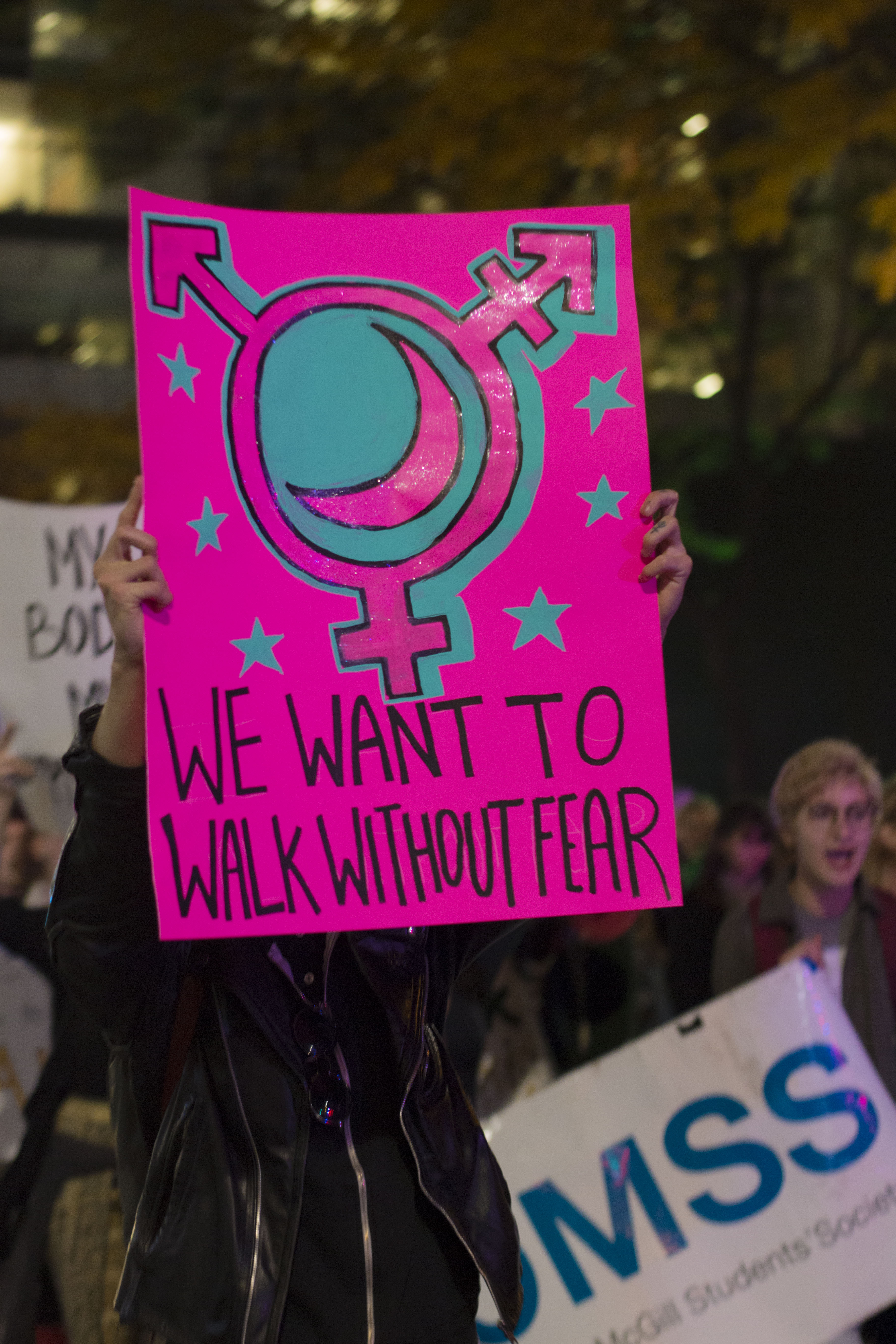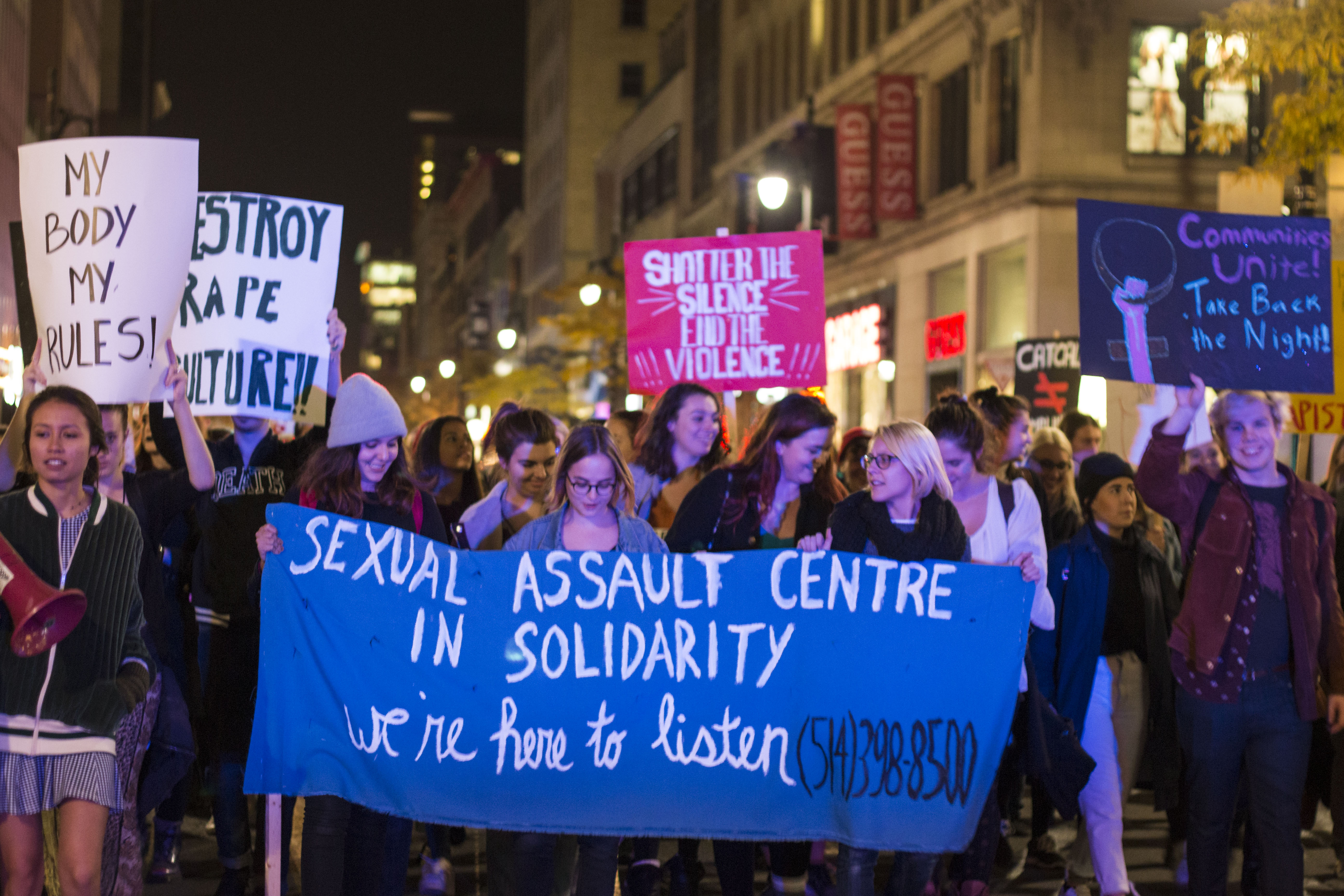Students took to the streets for the Take Back The Night march
Amidst a sea of eager hockey fans walking towards the Bell Centre on Thursday night, another 200 people took to the streets of Downtown Montreal for the annual Take Back The Night march against gender-based violence and harassment.

For four decades now, the international organization Take Back The Night has organized marches in dozens of cities across North America. This year’s Montreal edition was organized by A Safer Concordia, a campaign by the Centre for Gender Advocacy. Before heading along Ste. Catherine Street from Concordia University to McGill University, students gathered at Norman Bethune Square at the corner of Guy Street and De Maisonneuve Boulevard on the unseasonably warm November night, wielding signs reading “Stop Rape Culture” and “My Body My Rules.”
“I think it’s so angering that one gender over another doesn’t have as much of a right to public spaces as the others,” said Emilie Lamoureux of the Centre for Gender Advocacy. “I just want every gender to feel safe wherever they go, regardless of the time of day.”
In the past, the march has not been as inclusive and accepting of trans people and sex workers, and has even taken an anti-porn stance, said Lamoureux. But for the last three years since A Safer Concordia has been organizing the march, they have been trying to promote solidarity throughout the community, a recurring theme throughout the event’s speeches. “The purpose is to put those who are the least safe—so native women, sex workers and trans people of colour—at the front of the campaign and to provide a forum to be heard should the desire be there,” said Lamoureux.
The night began with a few words and a traditional prayer from Algonquin songwriter and activist for Missing and Murdered Aboriginal Women MJ Tremblay. “I just feel like there’s a good wave, there’s going to be a big change because we are hopefully going to have a government that’s going to be for us, serving us,” said Tremblay referencing specifically the new Minister of Justice Jody Wilson-Raybould.

Activist, writer and radio journalist Aimee Louw from Accessibilize Montreal continued the speeches by sharing some of her recent encounters with misogyny and ableism. “I don’t accept it. However you react is fine, but not all reactions are a choice; a lot of it happens behind closed doors. We need a collective response because some people are not just able to get up and leave,” said Louw.
As the march began and participants chanted things like “Whose streets? Our streets!” and “Investigate crimes of hate,” an onlooker yelled for marchers to “go home.” A collective “fuck you” rose from the marchers as they continued to make their way through the streets of downtown Montreal.
“I’m marching for safer streets for women and men to feel safe in their own space, in their environment no matter how they appear, no matter where they are, no matter what time of day it is, that they should be able to be safe and comfortable in their space,” said Concordia student Claire Macaulay.
Reaching McGill’s campus, marchers gathered to hear from several other speakers, including Chantel Henderson from Missing Justice. She shared her personal experiences as an indigenous woman living in Quebec and spoke of the violence and misogyny women and other members of her community continue to face regularly. She spoke of the current situation in Val d’Or where allegations of sexual abuse by police officers on indigenous women have arisen.
“As an indigenous woman, it’s hard to report any kind of crime to the police,” she said. “How can you report a crime when the police won’t believe you, or are the ones perpetrating the crimes?” Chantel shared that she herself has been the victim of sexual abuse, but her case is still open, and has not received any updates for a long time.
“I know it happened. I know it’s real,” she said.
Before heading into the school where marchers could meet and discuss with the night’s guest speakers, Charlotte, a volunteer for the Sexual Assault Centre of the McGill Students’ Society shared a concluding statement.
“Tonight we are making a clear statement: we are reclaiming the night. But we must also reclaim our right to all spaces where our voices have been stifled.”




Haha, the feminist method of reducing crime, everyone!
Meanwhile increased police presence and funding has been received considerable empirical support as an effective crime prevention tool. What evidence backs the effectiveness of screaming colleges girls and bristol board?
You sound cool.
Good one